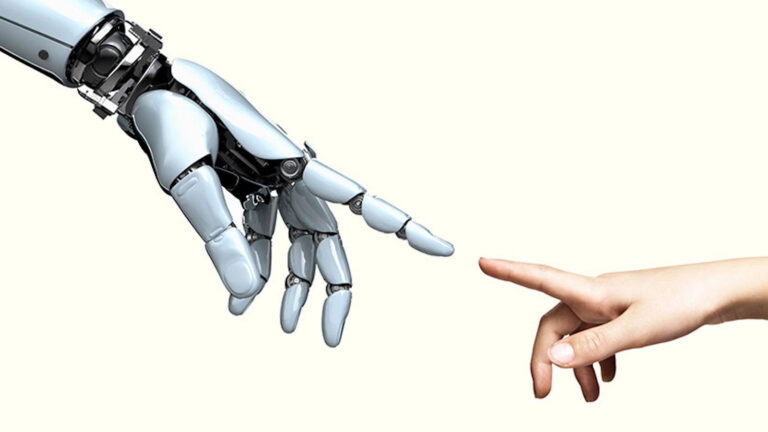Ah, to be rich, hopeful, and naive! Is there a more American alchemy of characteristics?
Nic Rowan wrote the late cultural critic Joan Didion believed “for Americans, a fall from grace was irredeemable, but the impossible struggle to regain it was ‘the single stunning fact in our literature, in our folklore, in our history, and in the lyrics of popular songs.’”
But not, presumably, artificial intelligence. A cursory Google search doesn’t reveal any of Didion’s thoughts on the rise of algorithmic “thinking,” though she doubtlessly would have found the concept inimical to mankind’s well-being. She brilliantly smeared, sliced, and scorched the flower children of San Francisco in her heyday—the environ that eventually bloomed into Silicon Valley. If LSD-hacking of human consciousness didn’t impress Didion, why would its mechanical equivalent?
Cards on the table: I sympathize with Didion’s moss-backed antipathy for “progress.” But even I have to ask what would America be without the dreamers, the bold bettors, the jeune ambitieux spirit? Jeff Bezos may be a cheeseparing industrialist overseeing galley-slave warehouses, but at least I can order the latest post-liberal manifesto delivered to my door in less than 24 hours. (Using the machine to undermine the machine? Zack de la Rocha’s got nothin’ on me!)
Nowhere is American ingenuity and blue-sky aspiration more on display than in the field of AI. Listening to the investors, coders, autistic nerds, and mad scientists enamored with creating “thinking” out of binary code is like listening to traveling evangelical preachers promising salvation: we’re always on the cusp of completely transforming society into a leisure-filled paradise.
In “AI Will Save the World,” Marc Andreessen dials the Pollyannishness up to 11. He insists on bringing us glad tech tidings. “I am here to bring the good news: AI will not destroy the world, and in fact may save it.”
Save is a strong word, and Andreessen has long demonstrated a strong Faustian belief in man’s ability to bring better living through technology. He isn’t doing a bit as what Andy Weissman called a “techno-optimist.” Andreessen is the real maniacal McCoy.
“What AI offers us is the opportunity to profoundly augment human intelligence to make all of these outcomes of intelligence—and many others, from the creation of new medicines to ways to solve climate change to technologies to reach the stars—much, much better from here,” Andreessen writes without reservation. The foolish notion of enhancing human intelligence doesn’t faze him at all—no primordial siren sounds in his soul. Were Andreessen to start gobbling down anti-androgens and go back to the Garden of Eden as an egg-headed Eve, he wouldn’t need the serpent to tempt his intellectual appetite. He’d snarf the forbidden fruit unbidden.
Andreessen understands centuries of storytelling warning us against elevating ourselves to deity status, from Prometheus to Skynet to H.G. Wells. But he’s undaunted in AI’s positive capabilities. Andreessen argues, “the idea that AI will decide to literally kill humanity is a profound category error.” (Fancy philosophical term! Drink!) “It is math—code—computers, built by people, owned by people, used by people, controlled by people,” he goes on. (Blind faith in humanity! Drink!)
So sentience is a non-starter concern just because artificial intelligence is “controlled by people”? Since it’s “Barbenheimer” season, is Andreessen aware the nuclear fission is and was used by people to devastating effect? And surely he realizes ballet-star Barbie’s perfectly poised polyvinyl chloride legs could impale a toddler’s eye? (Both if she’s arranged in the second position.)
And let’s not forget the mind-melting effect of Ben Shapiro’s 43-minute rebuttal to “Barbie,” guaranteed to cause more mass casualties than the Hiroshima and Nagasaki incineration combined.
The foreign-policy theorist Hans Morgenthau warned against idealistic diplomacy, writing, “The other school believes that the world, imperfect as it is from the rational point of view, is the result of forces which are inherent in human nature To improve the world, one must work with those forces, not against them.”
The same clear-eyed view applies to technological development. AI, or even the more powerful “artificial general intelligence,” may herald the next industrial revolution. The seemingly sentient wetware may produce for us our wildest entertainment dreams, including endlessly new seasons of “Mad Men.” Cheap, self-repairing synthezoids may spring up in every home, cleaning up after our kids and cooking us gourmet meals every night. Silicon transcendence may truly bring about a more frictionless and equitable society.
But these are all hypotheticals, even wishful thinking. Plenty of Andreessen Bay Area peers warn that AI can also trigger nuclear war—with no Petrov to save us. Neural-network pioneer Eliezer S. Yudkowsky all but guarantees human extinction if tech tinkerers keep trying to beat the Turing test.
Trusting AI’s safe, not-world-threatening usage to human control is a cold comfort. That doesn’t mean we instate Butlerian Jihad (though you’d hear no complaints from me). But it’s worth exercising a little more caution about how far computing power is allowed to be enhanced.
If you disagree, just remember how pleasant COVID lockdowns were. We’re soon about to learn how gain-of-function experimentation—deliberate engineering of more potent viruses—wasn’t totally safe despite strict human supervision.
The Wuhu flu killed nearly 7 million worldwide. AI isn’t a mere respiratory ailment. And we can’t simply hole up in our homes, hoping to save our families from roaming T-1000s.














Add comment